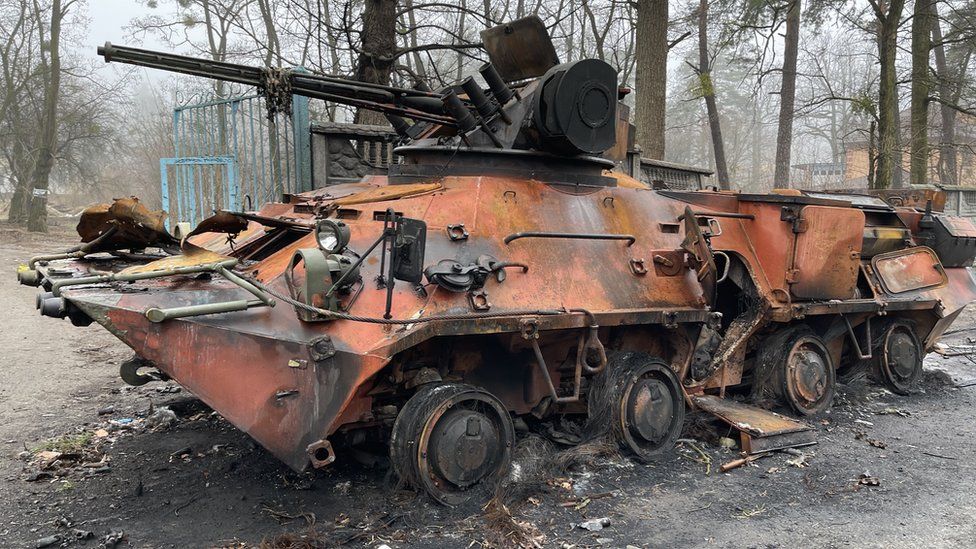The battle-scarred town of Irpin now stands as an example of Ukrainian resistance, and of Russian defeat. President Putin’s forces managed to enter the town but didn’t manage to push through it. If they had, Kyiv would have been their next stop – the capital is just a short drive away, 13 miles (21km) down the road. Blocking the Russian advance here was critical.
We reached the city centre under armed escort, driving through streets strewn with rubble and downed power lines – and devoid of life.
Ukrainian forces gave us a careful tour – avoiding some main roads. We were told Russian forces might be present in the forests on the outskirts, though the Mayor, Oleksandr Markushyn, insists the town itself is completely under Ukrainian control.
Troops proudly showed us a Russian armoured personnel carrier which had been torn to shreds, its turret upturned. Another burnt out Russian vehicle was just down the road. But we were moved quickly from place to place because of the ongoing risk of Russian shelling.
Most of the 70,000 people who used to live in this middle class commuter city fled over the past month – darting out of basements, running the gauntlet of relentless Russian shelling.
Many may have little left to come back to. President Putin claims he is not targeting civilian areas, but the destroyed homes of Irpin give the lie to that.
An error has occurred
{{terminalError}}
More people in more places trust BBC News than any other news source.
Register for a BBC account to see why.
Register
Many residential buildings in Irpin have been damaged or destroyed
We saw extensive damage in residential areas, including one high-rise block where a shell had punched a neat hole right through a corner apartment. There was a child’s red toy car on the ground, close to a forsaken playground. There were cars with bullet-riddled windscreens, and charred houses where the roofs have been ripped off.
Some of the dead still lie beneath the rubble. Others were buried hastily in courtyards and parks because a proper funeral was impossible. The mayor estimates that between 200-300 civilians were killed here, some directly targeted as they fled. The final death toll is likely to be higher.
The Russians had held 20-30% of the city, but the resistance here was dogged. Ukraine’s defence ministry has recognised “the mass heroism and resilience of the residents and the defenders” with the honorary title “Hero City of Ukraine”. The title dates from World War Two when it was awarded by the Soviet Union to several cities.
Inside the city, as heavily armed police and troops kept watch, there was a palpable layer of tension.
This victory was hard-fought, but troops we spoke to conceded that the Russians could be back at some point.
“Yes, I believe that,” said Serhiy Smalchuk, whose day job is TV presenting. “They need Kyiv, right, because Putin will lose if he doesn’t take over Kyiv. So, perhaps they will try but we are prepared in case they come back, and we will defeat them.”
Ivan Kolehin said he expected to die in the battle for Irpin
“We don’t know what they are thinking,” said Ivan Kolehin, a young territorial defence recruit. “I don’t think they will try again any time soon. Their ground forces have been removed but their artillery can still hit us.”
Ivan had a day job in marketing before he took up arms. He seemed to be struggling to process the battle for Irpin, and the fact that he is still alive.
“I never thought I would live,” he said. “On our third day we heard a whistle and they started to bomb us directly. We sat in the basement and the ceiling started to crumble. We were pretty scared.”
Now he worries for the future of the city.
“It’s still not safe here, but in due time we will rebuild,” he said. “Probably it will take years, considering the damage. I am trying not to think about the fact that every house that was destroyed was built by someone, sometimes with their own hands.”
He had Russian friends in the past, but not anymore.
“I hate the Russians from the depths of my heart,” he said. “There are no excuses for this.”
Civilians are still being evacuated from Irpin
Moscow now says it will drastically reduce its attacks around the capital, and focus on the eastern Donbas region. In reality the Kremlin had little choice, as its offensives around the capital had ground to a halt.
But in time Russian forces may regroup and target the capital again. If they do, the “hero city” will once again be in their path, and in the line of fire.
As we left Irpin a trickle of civilians were evacuating on foot, crossing a river bed on planks of wood balanced precariously on rubble and boulders. This is the wreckage of a bridge, blown up by Ukrainian forces to block the Russian advance – another sacrifice made by Irpin.
An ambulance was waiting for two elderly women, carried up the river-bank on stretchers – survivors of a merciless and failed Russian assault.
Further up the road a departing column of Ukrainian troops – with the swagger of victory – broke into an obscene chant about President Putin.
Source: BBC News


